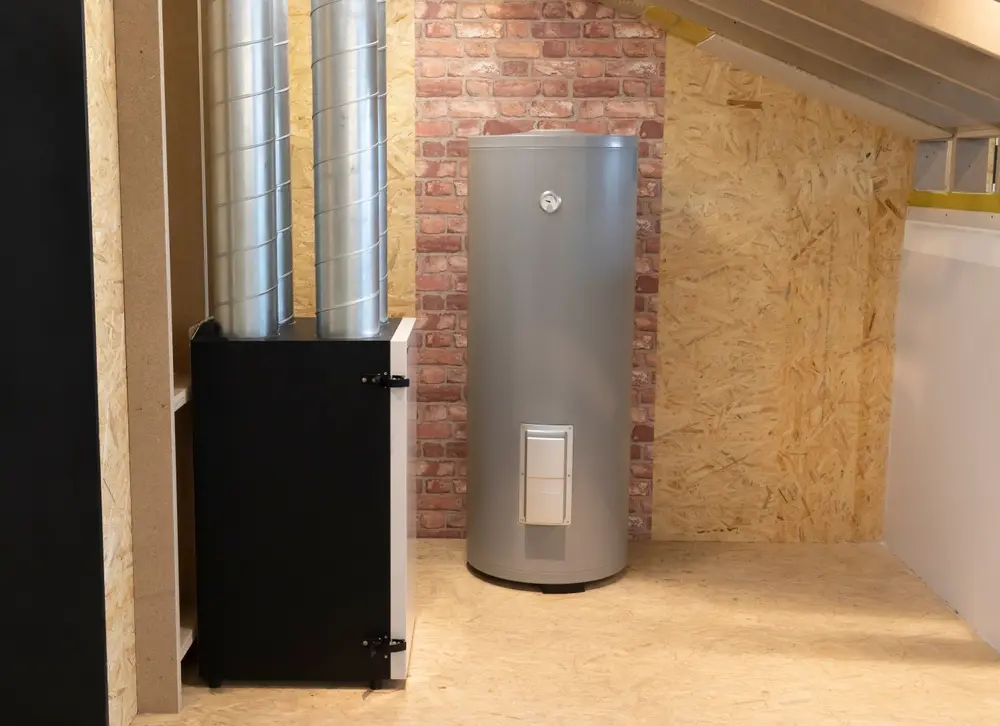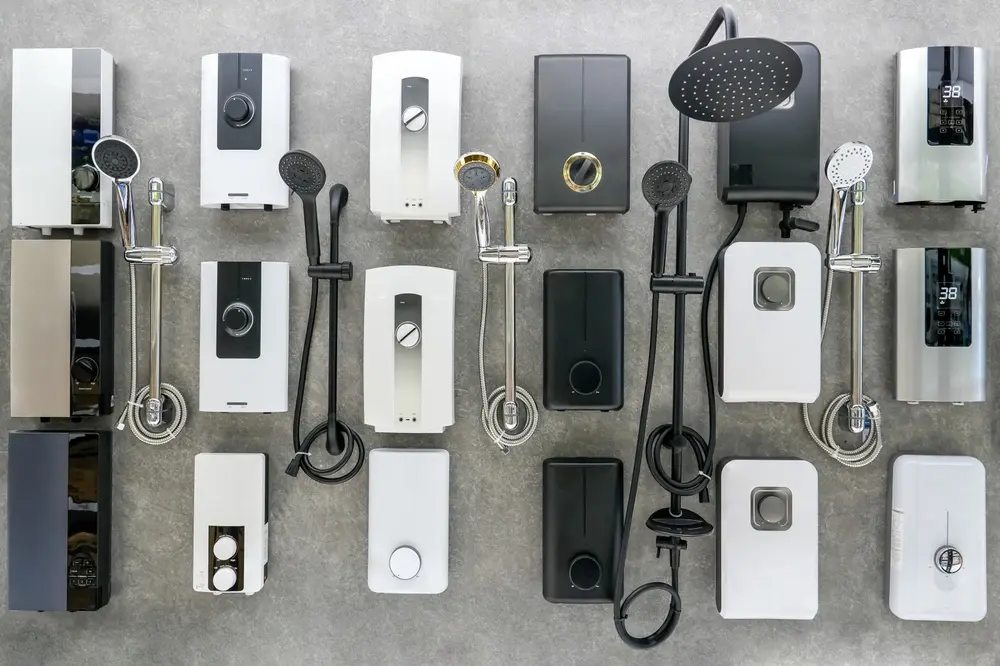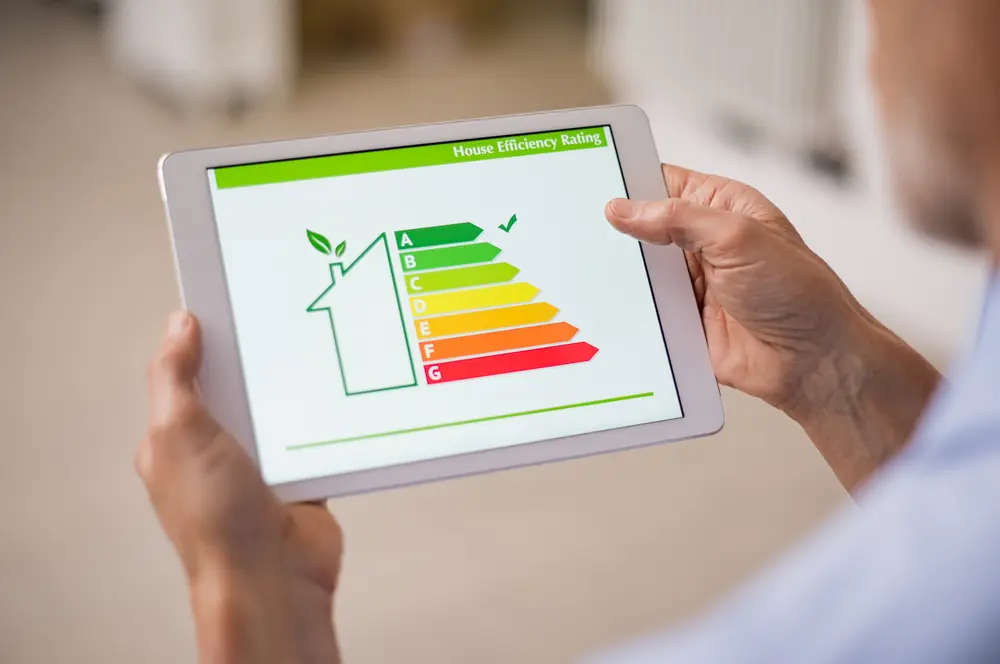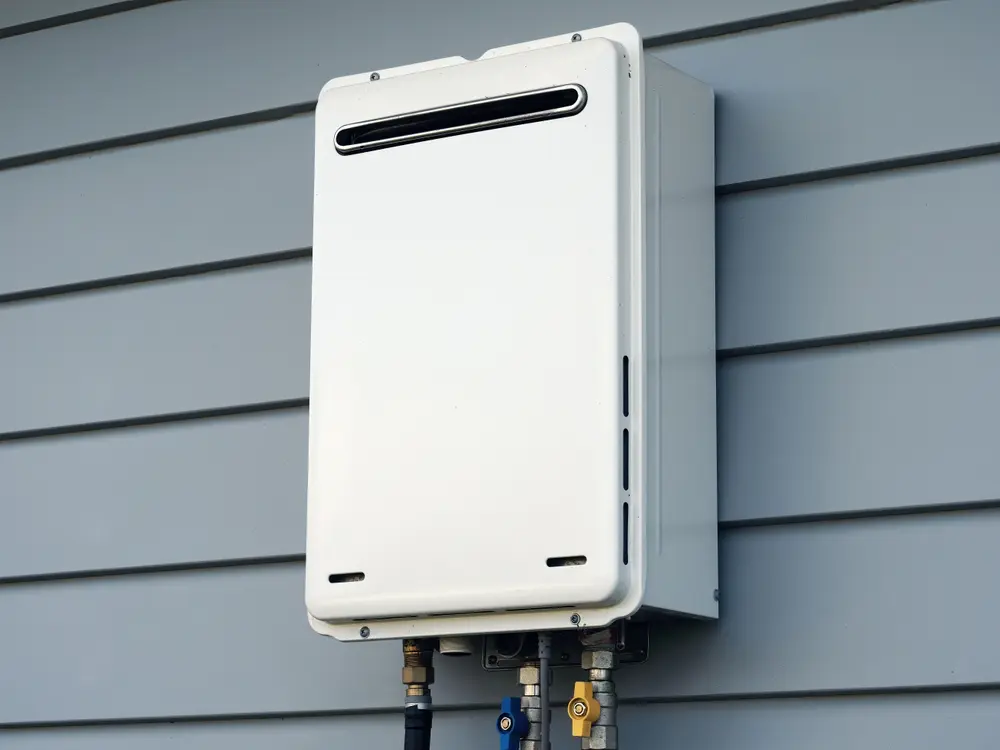
Your home’s water heater is a significant investment. When it’s time to replace it, remember this: whatever type of water heater you choose, you’ll live with your decision every day for over a decade. After all, we use hot water for just about every daily chore, from washing ourselves to cleaning our possessions.
So, when it comes to purchasing a tankless water heater vs a traditional water heater, which decision is right for you and your home? In the following guide, we’ll explain how tankless and tank water heaters work, the pros and cons of each, and provide you with pertinent factors to consider when making this important decision. We encourage you to weigh this information against your personal preferences and budget to make the most informed choice for your hot water needs.
To tank or not to tank? That is the question.
And here’s the answer…
The Difference Between Tank & Tankless Water Heaters
The first step to making smart hot water decisions is understanding the fundamental differences between tank and tankless water heaters. While both systems provide hot water throughout your home, they operate in distinctly different ways — each with its own cost, operation, and energy requirements.
How Does a “Traditional” Tank Storage Water Heater Work?
Tank water heaters provide a hot water reservoir in your home. They feature a large, insulated cylinder capable of holding between 40-80 gallons of water. When cold water enters the bottom of the tank, heating elements or burners — powered by either electricity or natural gas — warm the water to a preset temperature of around 120-140°F.

Tank water heater systems maintain this temperature 24/7 through a process called standby heating. As hot water naturally rises to the top of the tank, it’s ready to flow to your faucets and appliances when needed. Once hot water is consumed, cold water refills the bottom of the tank and triggers the heating cycle all over again.
How Does a Tankless Water Heater Work?
Tankless water heaters, also known as on-demand or instant hot water heaters, utilize modern efficiency in hot water delivery. Instead of storing hot water, these compact units heat water instantly as it flows through a powerful heat exchanger. When you turn on a hot water tap, cold water enters the unit, where it’s rapidly heated by either electric elements or gas burners.
The heat exchanger transfers heat to the water at an extremely efficient rate, providing a continuous stream of hot water as long as needed. Advanced sensors and computer-controlled systems ensure the water reaches your desired temperature, typically delivering between 2-5 gallons of hot water per minute depending on the unit’s capacity.
Things to Consider When Choosing a Water Heater
Selecting the right water heater for your home involves much more than a price tag comparison. Whether you’re replacing an aging unit or planning a new installation, several key factors will influence which system best meets your household’s needs.
From installation requirements and long-term costs to performance and safety considerations, understanding how tank and tankless water heaters compare across these important categories will help you make an informed decision. Let’s examine 6 of the most important factors to consider before investing in your next water heater.
Installation
Tanked: Requires dedicated space — such as a large utility closet or laundry room — and typically costs between $500-$1,000 for standard installation.
Tankless: More compact with flexible mounting options for smaller spatial requirements. Installation costs can reach $1,500 or more — especially if upgrading electrical or gas lines.
Lifespan

Tanked: Generally lasts 8-12 years before replacement becomes necessary. Potential failure points include tank corrosion and heating element burnout.
Tankless: Offers a significantly longer service life — typically 15-20 years — due to fewer standing water issues and replaceable parts.
Costs & Energy Efficiency
Tanked: Lower upfront purchase cost but higher monthly operating expenses due to continuous reheating of stored water.
Tankless: Higher initial investment offset by reduced energy costs over time through on-demand heating technology. According to the U.S. Department of Energy, tankless water heaters are 24% – 34% more energy efficient than traditional storage tank water heaters in homes with average hot water use.
Performance
Tanked: Provides a finite amount of hot water based on tank capacity, requiring recovery time between periods of heavy usage.
Tankless: Delivers unlimited hot water on demand — though output may be limited by flow rate capacity.
Reliability & Maintenance

Tanked: Requires annual flushing to remove sediment. Also, its internal components are more complex than those of an instant hot water heater, meaning more frequent part replacements or repairs.
Tankless: Needs minimal maintenance beyond periodic descaling. Additionally, fewer mechanical parts lower the potential for periodic failure.
Safety & Ease of Use
Tanked: Aging units run the risk of leaking, flooding, or pressure buildup — particularly in models past their recommended lifespan.
Tankless: Features modern safety systems including automatic shutoff protection and precise temperature control, with minimal risk of water damage.
Tankless vs. Tank Water Heaters: Pros & Cons
When deciding between a tank and tankless water heater, it’s essential to weigh the advantages and disadvantages of each system against your specific needs. While both types can effectively heat your home’s water, their distinct operating principles create unique benefits and potential limitations.
Here’s a detailed breakdown of tankless water heater pros and cons:
Tankless Water Heater Pros
- Superior energy efficiency
Since tankless units only operate when hot water is needed, average homes can save 24-34% on water heating costs.
- Less stress
Endless hot water supply and consistent temperatures eliminate the frustration of running out during showers or back-to-back loads of laundry.
- Space-saving
Compact design that saves valuable living space, with most tankless units mounting on walls and measuring only about 28″ tall x 20″ wide x 10″ deep.
- Longer life
Extended lifespan of 15-20 years with proper maintenance, reducing long-term replacement costs and environmental impact.
- Modern technology
Advanced features include precise temperature control, smartphone connectivity, and built-in recirculation systems for enhanced convenience.
- Financial incentives
Potential eligibility for energy efficiency tax credits and rebates that can help offset the higher initial cost.
Tankless Water Heater Cons
- Higher upfront cost
Significantly higher upfront cost, with units typically ranging from $1,000 to $3,000 before installation, compared to $300-$900 for traditional tanks.
- Flow rate constraints
Limited flow rate capacity may require multiple tankless units in larger homes or when simultaneous hot water usage is common.
- More difficult to install
More complex installation often requires upgrading gas lines, venting, or electrical systems, adding to initial costs.

“Traditional” Tank Pros
- Lower upfront cost
For budget-conscious homeowners, tank water heaters are a more affordable upfront investment, typically priced 40-60% less than comparable tankless models.
- Easier to install
A simpler installation process that usually doesn’t require modifications to existing plumbing or electrical systems, reducing initial setup costs and complexity.
- Higher flow rate capacity
Better handling of high-demand situations, as the stored hot water allows multiple fixtures to run simultaneously without temperature fluctuations or reduced flow.
- Traditional water heating solution
Proven technology with widely available replacement parts and numerous qualified technicians familiar with repairs and maintenance.
- Operable during emergencies
Works effectively during power outages, as the insulated tank can provide hot water for several hours even without power.
“Traditional” Tank Cons
- Less energy efficient
Significant energy waste through standby heat loss, as the unit constantly uses energy to maintain water temperature even when hot water isn’t being used.
- Tank capacity limitations
Limited hot water supply based on tank capacity — typically providing only 40-80 gallons before requiring recovery time — which can be inconvenient for larger families.
- Takes up more space
Substantial space requirements, with most units requiring a dedicated area approximately 24″ wide x 24″ deep x 60″ tall, limiting installation flexibility.
- Shorter life
Shorter lifespan averaging 8-12 years, with increasing risk of leaks and failures as the unit ages.
- Water damage risk
Potential for catastrophic failures, including flooding from tank ruptures that can cause significant property damage.
Choosing the Best Water Heater for Your Long-Term Needs
Ready to take the next step and upgrade your water heater? Or, perhaps you still have questions about choosing between a tankless water heater vs a tank water heater? Charles Stone Mechanical is here to help. Since 1991, our team of experienced plumbing professionals has been providing hot water solutions for the residents of Cookeville, Nashville, Murfreesboro, and the surrounding area.
We’re available to guide you further through the water heater selection process, offering convenient scheduling and flexible financing options. And once you’re ready to install your new water heater, Charles Stone Mechanical is trained to deliver an exceptional experience. Our certified technicians know how to install tankless and tank systems with precision for dependability that lasts.

